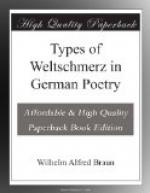But a time of still greater unhappiness was in store for him when he left his home at the age of fourteen to enter the convent school at Denkendorf, where he began his preparation for a theological course. A more direct antithesis to all that his body and soul yearned for and needed for their proper development could scarcely have been devised than that which existed in the chilling atmosphere and rigorous discipline of the monastery. He had not even an incentive to endure hardships for the sake of what lay beyond, for it was merely in passive submission to his mother’s wish that he had decided to enter holy orders. And now, clad in a sombre monkish gown, deprived of all freedom of thought or movement and forced into companionship with twenty-five or thirty fellows of his own age, who nearly all misunderstood him, Hoelderlin felt himself wretched indeed. “Waer’ ich doch ewig ferne von diesen Mauern des Elends!” he writes in a poem at Maulbronn in 1787.[18] There was for him but one way of escape. It was to isolate himself as much as possible from the world of harsh reality about him, to be alone, and there in his solitude to construct for himself an ideal world of fancy, a poetic dreamland. This mental habit not only remained with him as he grew into manhood, it may be said to have been through life one of his most distinguishing characteristics. It would be impossible to make room here for all the passages in his poems and letters of this period, which reflect his love of solitude and his habit of retreating into a world of his own imagining. His letters to his friend Nast almost invariably contain some expression of his heart-ache. “Bilfinger ist wohl mein Freund, aber es geht ihm zu gluecklich, als dass er sich nach mir umsehen moechte. Du wirst mich schon verstehen—er ist immer lustig, ich haenge immer den Kopf."[19] Another letter begins: “Wieder eine Stunde wegphantasiert!—dass es doch so schlechte Menschen giebt, unter meinen Cameraden so elende Kerls—wann mich die Freundschaft nicht zuweilen wieder gut machte, so haett’ ich mich manchmal schon lieber an jeden andern Ort gewuenscht, als unter Menschengesellschaft.—Wann ich nur auch einmal etwas recht Lustiges schreiben koennte! Nur Gedult! ’s wird kommen—hoff’ ich, oder—oder hab’ ich dann nicht genug getragen? Erfuhr ich nicht schon als Bube, was den Mann seufzen machen wuerde? und als Juengling, geht’s da besser?—Du lieber Gott! bin ich’s denn allein? jeder andre gluecklicher als ich? Und was hab’ ich dann gethan?"[20] There is a world of pathos in this helpless cry of pain, with its suggestion of retributive fate. A poem of 1788, “Die Stille,” written at Maulbronn, epitomizes almost everything that we have thus far noted as to Hoelderlin’s nature. He goes back in fancy to the days of his childhood, describing his lonely rambles, from which he would return in the moonlight, unmindful of his lateness for the evening meal, at which he would hastily eat of that which the others had left:




